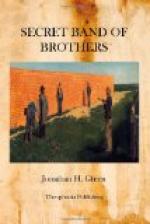the next day. I returned according to promise;
called at our boarding-house, and upon inquiry learned
he was out in the city. I took a stroll up to
our friend’s, the coffee-house keeper, in Market
street. While I was passing through the market-house,
I passed by a man with a large load upon his back.
I could not discover what the bulk was. I passed
on to the coffee-house, where three of the boys were
dividing one hundred and sixty-five dollars, the proceeds
of the day’s work, which, they informed me, they
had obtained from one of the soft-shell brethren.
That in the course of the day they had met a countryman,
and seeing he was apparently upon the look-out for
speculation, they had finally entered into conversation
with him, and had accidentally shown him some bright
half dollars, and told him they were counterfeit.
“What,” said he, “bogus?” “Bogus,
indeed,” said one. “And do you know
what, bogus is?” He said he ought to, and they
then tried him, and found him one of the right kind
of brethren to skin; and that they did in the following
manner: Finding that he had money and wanted
“bogus,” they set upon a plan to deceive
him; which they did by showing him the new half dollars,
and telling him they were good coin; and that if he
wished he could have them at fifteen dollars for a
hundred dollars of “bogus.” He agreed
to purchase one hundred and sixty-five dollars’
worth, which they were to supply that evening.
That they were to meet him in the Fifth street market-house,
and deliver his bogus in a tobacco keg headed up.
He of course took it for granted that all was honest.
They separated from him, purchased a tobacco keg, filled
it with stone-coal cinders, within an inch of the top,
packing them very hard to make them weigh heavy.
They then put a false head one inch from the top,
upon which they put two hundred copper cents.
They then placed another head upon that, confining
it tight with a hoop. After preparing it, they
rolled it into the market-house where they had met.
He had paid them the one hundred and sixty-five dollars
for the cinders, which he supposed to be the most
beautiful bogus, and when he lifted the keg he was
satisfied all was right; and how could he doubt
it, they were brethren! and they were then dividing
the spoils. I suspected, from description, it
was our Lawrenceburgh friend, but remained silent,
and returned to my room where I knew I could ascertain.
When I went, I discovered my friend just ascending
the stairs, with a large keg upon his shoulder.
“Halloo,” said I, “what upon earth
have you here?” He dropped the keg, as though
he had been shot, making a crash to be heard a half
mile distant, but fortunately no person about the house
appeared much disturbed. The old lady came to
the door, and wanted to know what was the matter.
I told her my friend had fallen, but that no damage
was done. She retired. As soon as he discovered
it was me, he raised his burden once more, and carried
it to the room. “Come in, sir,” said




